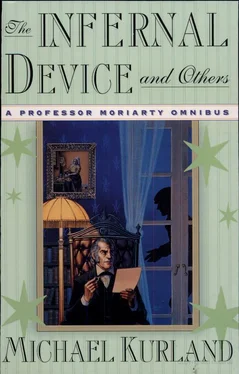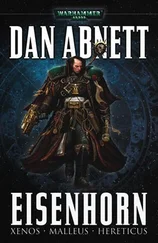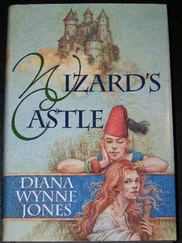"A hair can be evidence, my lord," Holmes said, rising and stalking into the entrance hall himself, so that d'Hiver was forced to follow. "Or a bit of fluff, or a speck of dirt lying on the carpet. Just by walking over such a minuscule object, you may remove it; or you might inadvertently leave behind a hair or a few grains of dust yourself, thus confusing the real evidence."
D'Hiver stared at Holmes, trying to decide whether the famous consulting detective was serious. "Preposterous," he said uncertainly.
"Not at all, my lord," Holmes assured him. "The smallest trifle can be of the utmost importance, to one trained to observe and practiced in making logical deductions from what he observes. I once cleared up an obscure murder by winding a watch; and another time I descerned a dreadful secret because I noticed the depth to which the parsley had sunk into the butter on a hot day. Then again, I once cleared a man named Estermann of the charge of murdering his wife because of noting something as fragile as a cobweb."
D'Hiver pursed his lips thoughtfully, continuing to glare up at the hawk-nosed consulting detective. "If you can make so much of so little," he said, "why don't you have more on this case? Seven murders so far, Mr. Holmes."
"I am aware of the body count, my lord," Holmes said. "This is only the second opportunity that I have had to arrive in time to try to rescue some of this small detail before it is ground into the dust by hordes of police inspectors, Home Office officials, reporters, curiosity seekers, and cleaning women. I have hopes of developing something from what we find here." Noting Lestrade's frantic signaling from behind. Count d'Hiver's head, Holmes continued, "May I ask how it happens that you are here, my lord?"
"Come now, Holmes, you know of my position and my interest."
"Indeed, my lord," Holmes said. "It is your information that I question. How did you know to come here?"
"Ah!" d'Hiver said. "Now I comprehend. You wonder how I popped up so mysteriously at the opportune moment at the — what do you call it? — scene of the crime. Is that it?"
"Yes, my lord."
"It is not so strange. The commissioner notified the Earl of Arundale when word came in, and Arundale notified me. And here I am. I confess I rather fancied the chance to view the actual site of one of these senseless killings so soon after it happened; but I was not prepared for the appearance of that corpse. It makes death look very unappealing. One would just as soon not see such a thing soon after a meal."
The soft footsteps of Gammidge, the valet, coming down the stairs, interrupted the conversation. He looked startled as three pair of eyes turned to watch him descend. "I could find nothing amiss, Mr. Holmes," he said. "As far as I can tell, no one has been in the master's bedroom since he left it this evening."
"And the hat and shoes?" Holmes asked.
"Not in evidence, Mr. Holmes."
"Come now," Count d'Hiver said, "this sounds interesting. Hat and shoes?"
"Missing, my lord," Lestrade said. "I have sent some men out looking for them."
"The victim's?"
"Yes, my lord," Holmes said. "Evening dress: a black silk hat and black patent-leather shoes."
"Taken by the killer? How very fascinating. Whatever for?"
"Mr. Holmes knows," Lestrade said, "but he's not saying."
"I have a theory, that's all," Holmes said. "The recovery of the shoes will tell whether I am right."
"And if they're not recovered," Lestrade said, "it will show that I'm right: they were taken to replace the killer's own shoes."
"It does seem an odd thing to do," Count d'Hiver said, "taking the victim's shoes and top hat."
The door of the library, down the hall from where they were standing, opened, and a team of two plainclothesmen emerged. "We have checked all around the ground floor, Inspector," the taller of the two told Lestrade. "As far as we can tell, there is no way that the murderer could have entered or left the premises. All windows are securely fastened; the rear egress is double-bolted from the inside; the stairs to the cellar, which emerge in the butler's pantry, have a door which is closed and bolted at the upper end. It is a flimsy bolt, but nonetheless it has not been violated."
Lestrade nodded. "What we expected," he said. "Just on the off chance, MacDonald, check around upstairs, also."
"Yes sir!" MacDonald said, making a perfunctory gesture that somewhat resembled a salute, and the two plainclothesmen turned and headed up the broad stairway.
"If you don't mind, my lord, I would like to go back to my examination of the victim and the murder room," Holmes said.
"If you don't mind, Mr. Holmes," Count d'Hiver replied, "I'd like to watch." He held up a hand to cut off Holmes's retort. "I'll stand in the doorway," he promised, "and I will not disturb you, except, perhaps, with a very occasional question. I know you think me overly critical, but it may be because I do not grasp the complexities of your task. I begin to see that this is so from the conversation we have just had. Perhaps if I am permitted to observe, it will instill in me a proper appreciation for the difficulties of your profession."
"Perhaps, my lord," Holmes said dryly. "At any rate, if you wish to observe, silently, from the doorway, you are welcome to do so."
One of the constables guarding the portals came into the hall. "Beg pardon, sir," he said to Lestrade, "but there's a reporter outside who wants to speak with someone in charge."
"A reporter?" Lestrade swiveled around.
"Morning Chronicle, sir."
"Tell the Morning Chronicle to return in the morning," Holmes said. "We can't be bothered with that now. Tell him we'll have a complete report of the crime available to the press in the morning. Say seven-thirty."
"Beg pardon. Mr. Holmes, but it's a young lady."
Holmes looked irritated. "What's a young lady?"
"The reporter, sir."
"A young lady?" Lestrade was clearly scandalized. "The reporter for the Morning Chronicle?"
"Yes, sir. There is a gentleman with her, a sketch artist. They would like to see the, ah, room, Inspector. Where the victim is, you know. And she says that she is put to bed at three, so she would really like the information now."
"She is put to bed at three?" Count d'Hiver asked, looking vaguely amused. "By whom?"
"No, no," a musically feminine voice said from the front door, and the reporter for the Morning Chronicle, Miss Cecily Perrine, entered the hall. Behind her trailed a small man with a brown bowler hat, a wide walrus mustache, and a sketchpad. "It is the newspaper that is put to bed at three," Cecily Perrine explained, unfastening her wide brown sealskin cape and folding it over her arm. "Which is why I would like some details of the crime now, so that my readers will have the opportunity of learning all about it over their morning kippers."
"Miss Cecily Perrine, isn't it?" Sherlock Holmes said. "I thought you were a valued employee of the American News Service."
"Life is change, Mr. Holmes," Cecily said. "Good morning, Inspector Lestrade. I see you're wondering what I'm doing here. My editor sent a boy with a carriage around for me and my colleague here when he received word of the murder. He would not allow the late hour, nor the fog, nor the chilling weather to interfere with his reporters' getting a good story."
"And just how, if you don't mind my asking, did he get word of the murder?" Lestrade asked.
"I have no idea," Cecily Perrine said. "I imagine he has a friend at the Yard. You'll have to ask him."
The Count d'Hiver stepped forward and took Cecily's hand. "Allow me to introduce myself," he said, bending forward at the waist with what was almost a parody of a Continental bow. "The Count d'Hiver at your service."
Читать дальше












